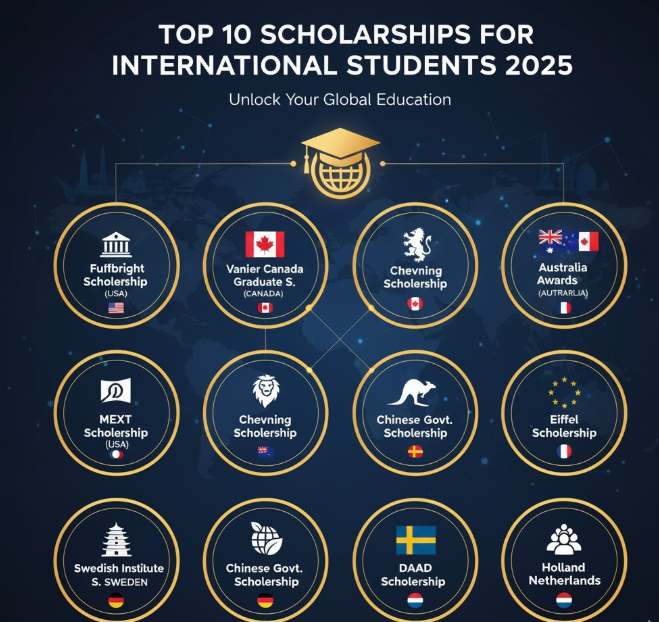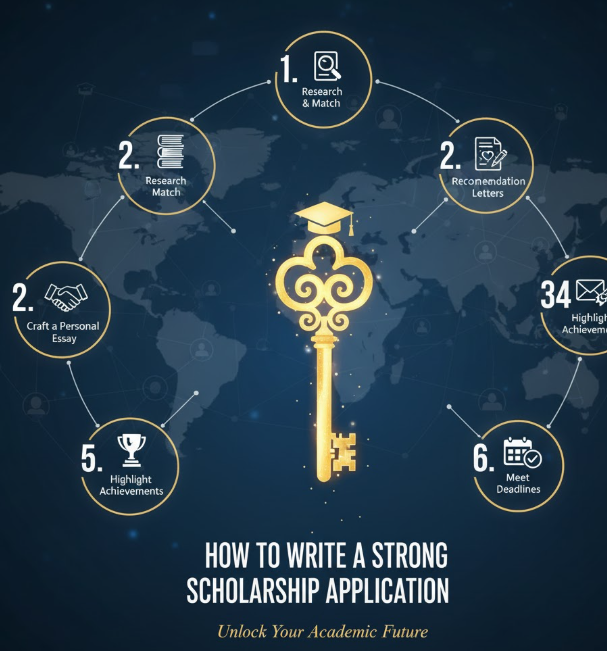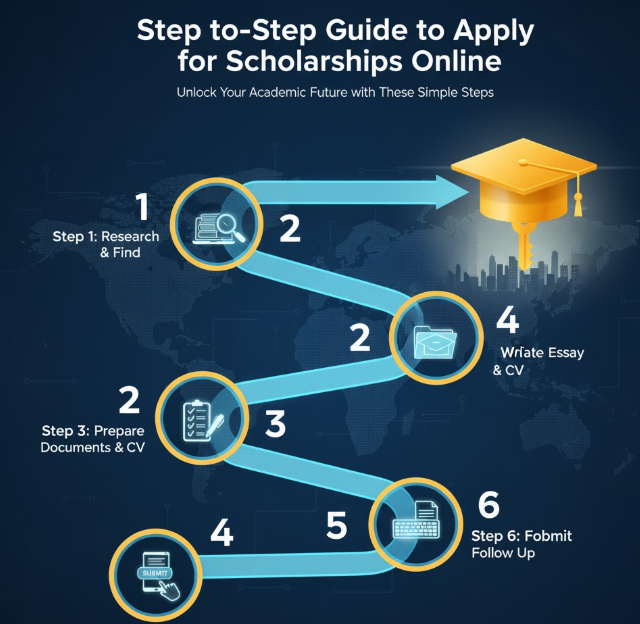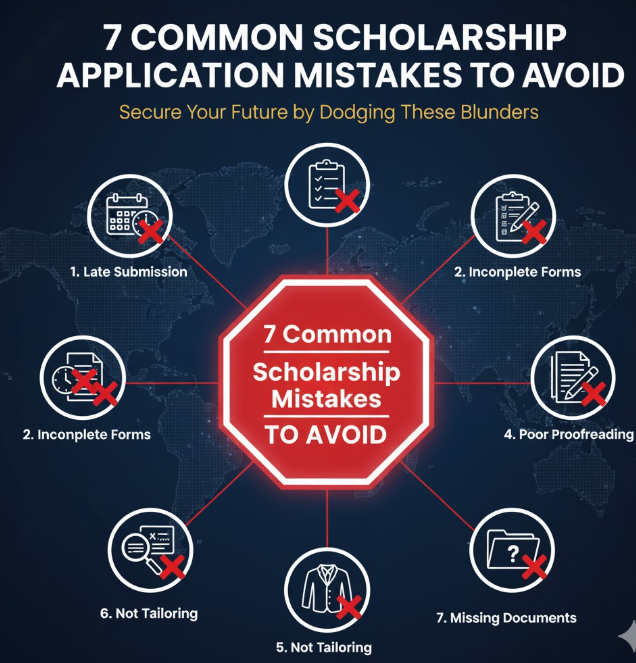It’s a dream of millions of students around the world to study abroad and getting through the cost column can be quite exhausting. Tuition, living expenses, travel and books can all total tens of thousands of dollars a year. The good news? There are incredible scholarships specially designed to help international students achieve their dreams without tens of thousands in student loan debt.
No matter if you’re planning to study engineering in Germany, medicine in Australia or business in the United States, scholarships can pay for everything from tuition fees to monthly living expenses. And these opportunities are not just for straight-A students — many programs seek out leadership, community service work and special talents.
In this guide, we are going to be looking into the top 10 scholarships available for international students in 2025. Each program has its own offer, and we’ll make sure you know exactly what — who can apply; what’s offered; how to do so; and tips to give you the best chance. Let’s delve in to find the right scholarship for your college endeavors.
Why Scholarships for Overseas Students are Important
But what is the reasoning behind spending scholarships and why are they so essential? International students tend to pay much more in tuition than domestic students — sometimes two or three times as much. Bachelor’s degrees in the US can be between $20,000 and $60,000 a year (UK:£15,000 to £45,500), whereas UK programs are priced from about £10,000 to £38,000 each academic year.
Scholarships eliminate these financial hurdles and offer many advantages:
- Debt free upon graduation, so you can begin your career without worrying about money
- Access to exclusive universities they could not otherwise access (or afford)
- Opportunities to network with fellow scholars from across the globe
- Improved resume features future employers desire
- Focus on your studies instead of working several part-time jobs
So, now let’s take a look at the scholarships that help make all this happen.
1. Fulbright Foreign Student Program (United States)
Fulbright is the world’s most prestigious international educational exchange program, offering opportunities for students, scholars and professionals to undertake international graduate study, advanced research, university teaching and teaching in elementary and secondary schools worldwide. Founded in 1946, it has assisted more than 400,000 students from over 160 countries to study in the United States.
What’s Covered
It’s a very generous scholarship and offers:
- Complete tuition fees for master and PhD programs
- Monthly allowance for living expenses (about $1,500 – $2,000 varies by location of host university)
- Round-trip airfare to the US
- Health insurance coverage
- Arrival orientation and ongoing support
Who Can Apply
Students from more than 155 participating countries are eligible to apply. You need:
- A bachelor’s degree or equivalent (for master)
- Competence in English (TOEFL or IELTS scores)
- Strong academic record
- Leadership capacity and a desire to return home
- 1-2 years of work experience
- No previous US degree (in most cases)
Application Tips
Applying for Fulbright is hard. Begin by reaching out to the Fulbright Commission in your home country at least a year before you hope to study. Determine what struggling areas of your home country you’ll address with your US education. Strong letters of recommendation from professors who are familiar with your work can help a lot.
2. Chevening Scholarships (United Kingdom)
Chevening Scholarships are the UK government’s global scholarship program, funded by the Foreign, Commonwealth & Development Office. They strive to shape future leaders and decision-makers by giving them the opportunity to study in the UK.
What’s Covered
Chevening scholars receive:
- Full university tuition fees
- Stipend of £1,347 per month (in 2024-2025)
- Round-trip flights to the UK
- Visa application costs
- Travel bursaries to attend Chevening events
- Exclusive networking opportunities with UK leaders and other scholars
Who Can Apply
You must be:
- A citizen of a Chevening-eligible country (there are over 160)
- Holding an undergraduate degree
- Applicants should have minimum of two years working experience (approximately 2,800 hours)
- Submission to three distinct UK degree courses
- You have no intention to return to your home country for two years after studies
Application Tips
Chevening is VERY heavy on leadership potential and networking skills. Your essays should detail the most impressive examples you can think of where you have led, caused change or had a significant influence on others. The program also places a premium on diversity, so emphasize what sets your worldview apart. Applications usually open in August and close in November for the September following.
3. DAAD Scholarships (Germany)
The DAAD is one of the world’s largest and most respected funding organizations for the international exchange of students and researchers. Germany is world-renowned for the quality of its education and has one of the lowest (or no) tuition fees at public universities in Europe, and DAAD scholarships just make everything twice as nice!
What’s Covered
There are many scholarship programs under DAAD but the most common ones are:
- Monthly payments between €934 and €1,300 according to your degree level
- Health insurance coverage
- Travel allowance
- Support in course cost of German language (if required)
- Study and research allowances
Who Can Apply
DAAD has multiple scholarship schemes. The most common is for students in graduate programs leading to master’s or PhD degrees. Requirements include:
- Applicants should have completed a Bachelor’s degree (for Master’s studies) with above average grades
- At least 2 years postgraduate experience after the last degree gained
- Well-defined realm or topic that matches your prior study
- Link between your education and development challenges in your country of origin
Application Tips
DAAD appreciates academic excellence but they also would like to hear about motivation and clear career plans. Your statement of purpose should describe, in detail, exactly why you chose your particular program and how it fits into your larger goals. Since many programs in Germany are taught in English, you’ll also need strong TOEFL or IELTS scores. Programs typically start the following October, and applications generally open in August.
Boost your career: Best online courses to improve career skills here.
4. Australia Awards Scholarships
Australia Awards are supported by the Australian Government and are intended to assist students from developing countries in the Indo-Pacific region. This scheme is intended to develop various skills and knowledge that help promote growth in your country of origin.
What’s Covered
It’s one of the most generous scholarships out there:
- Full tuition fees
- Return air travel
- Settlement allowance of $5,000 on arrival
- Monthly contribution to make monthly payments (around $3,000)
- Overseas Student Health Cover
- Pre-course English language training (if necessary)
- Introductory Academic Program
- Fieldwork allowance (if this field is applicable to your study)
Who Can Apply
Requirements differ in different countries, but in general you’ll need:
- Good citizen of an eligible country (primarily Asia, Pacific, Africa and Middle East regions)
- At least two years of work experience
- Not have an Australian visa at time of application
- Willing to go back to your home country for a minimum of two years afterwards
- Satisfying the language requirement of a University in which you want to enroll
Application Tips
At Australia Awards, development impact is strongly emphasized. Your application should also include an explanation of how your studies will contribute to development priorities in your home country. Study your country’s development challenges and match your study plans based on those needs. Applications tend to open in February and close at the end of April.
5. Erasmus Mundus Joint Masters Scholarships (Europe)
Erasmus Mundus is a special European Union project that provides funding opportunities for international students to study at multiple universities on the continent. You will spend time in at least two different European countries throughout an integrated master program.
What’s Covered
Scholarship recipients receive:
- Full tuition fees
- Monthly allowance of €1,400
- Contribution to the travel and installation expenses (€1,000 per year)
- Insurance coverage
Who Can Apply
These grants are available for students from all around the world. Requirements include:
- Bachelor’s degree or equivalent
- Certain requirements of your chosen Erasmus Mundus program (each program has its own conditions)
- Knowledge of English (and possibly other languages, depending on the program)
Application Tips
There are more than 130 Erasmus Mundus programs, ranging from robotics to journalism to sustainable tourism. Begin searching for the programs that suit you on the Erasmus Mundus official site. Each program has unique application deadlines and admission requirements. Multiculturalism is a big selling point—make sure to highlight in your application how studying in different parts of Europe will enhance your education and career.
6. Swiss Government Excellence Scholarships
Switzerland enjoys a reputation for world-class universities and cutting-edge research. The Swiss Government Excellence Scholarships are aimed at young researchers from abroad who have completed a master’s degree or PhD and foreign artists holding a bachelor.
What’s Covered
Scholarship holders receive:
- A monthly stipend of CHF 1,920 (about $2,200)
- Tuition fee waiver
- Health insurance
- Housing allowance
- One-time flight allowance
Who Can Apply
These scholarships target:
- Master’s, PhD, or postdoctoral researchers
- Artists receiving education at Swiss conservatories or art schools
- You must come from a country where there is not thousands applying
- High-performing students who can be good in research
Application Tips
The Swiss system is extremely decentralized — you need to first find a professor at a Swiss university who’s willing to take you on as a doctoral student. Your Plan of Research is your most important application component. Make it specific, achievable, and tell us exactly why Switzerland is the best place to carry out this work. They’re usually placed through the Swiss embassy in your home country.

7. Gates Cambridge Scholarships (University of Cambridge, UK)
The Gates Cambridge Scholarships are one of the most prestigious international scholarships in the world. Funded by the Bill and Melinda Gates Foundation, scholars attend full-time postgraduate courses at the University of Cambridge.
What’s Covered
This prestigious scholarship provides:
- All costs of studying at Cambridge (tuition and college fees, etc.)
- A maintenance stipend of £21,000 per annum
- One economy airfare at both the beginning and end of the course
- Immigration Health Surcharge
- Family allowance (for students with children)
- Fieldwork funding (up to £2,000)
- Discretionary fund for conference and courses
Who Can Apply
Gates Cambridge Scholarships are offered to students from countries outside the UK. You must:
- Apply to study full-time at Cambridge for a postgraduate degree (PhD, MSc or MLitt, one year master’s)
- Demonstrate outstanding intellectual ability
- Show leadership potential
- Dedication to making the lives of others better
- Demonstrate a good match between your skills and ambitions
Application Tips
Thousands of people apply each year for the roughly 80 scholarships Gates Cambridge awards annually, so it’s competitive. The criteria the selection committee are looking for include outstanding intellectual ability, leadership potential, a commitment to improving the lives of others and a good fit with Cambridge. Use your personal statement to illustrate each of the criteria. Strong academic references are crucial.
8. Rotary Peace Fellowships
Rotary peace fellowships for leaders who want to prevent wars and work on peacemaking. You may attend one of Rotary’s universities where partnerships are in place with Duke University, the University of Queensland and Uppsala University among them.
What’s Covered
The fellowship covers:
- Tuition and fees
- Room and board
- Round-trip transportation
- Internship and field-study expenses
- All program-related costs
Who Can Apply
Rotary seeks applicants who:
- Have strong capabilities in English (knowledge of further languages is an advantage)
- You have relevant working experience (minimum 3 years for master’s)
- Are dedicated to peace and conflict resolution
- Can demonstrate leadership skills
- Intend to leverage knowledge for community peace efforts
Application Tips
Rotary Peace Fellowships seek candidates who have professional experience with peace-building, not just an academic interest. Examples of specific projects where you have worked for peace, negotiated conflicts, or brought opposing groups together should be included in your application. Not essential, but helpful is a connection to a local Rotary club. The application process opens in February every year.
9. Joint Japan World Bank Scholarship Program
The scholarships are available to students from developing countries wishing to study development-related programs in various countries. Upon graduation, scholars return home to help shape the future of their countries.
What’s Covered
The scholarship provides:
- Tuition fees
- Monthly living stipend
- Round-trip airfare
- Health insurance
- Study tour
Who Can Apply
Applicants must:
- Come from a developing member country of the World Bank
- Hold a bachelor’s degree
- A minimum of three years of continuous recent paid professional experience in the field of development-based work
- Apply to Master Program(s) of choice at any of the eligible Universities
- Be no older than 45 years
Application Tips
This scholarship focuses on work experience in development and a pledge to return home. Your application must give a clear explanation of how your proposed studies contribute towards development priorities in your country. The program will help in areas such as economic policy, health and education, agriculture, environment, infrastructure, etc. The deadline is usually late March or early April.
10. Aga Khan Foundation International Scholarship Program
The Aga Khan Foundation grants scholarships to exceptional students from the developing world who otherwise have no means of sponsoring their education. This is a special program because half the funds are in the form of grant and half a no interest loan.
What’s Covered
The program provides:
- 50% grant (non-repayable)
- 50% loan (no interest, and payable over 5 years from two years after graduating)
- Including tuition, room and board, fees and other expenses
Who Can Apply
Preference will be given to students from:
- Countries with development programs of the Aga Khan Development Network (primarily South and Central Asia, Sub-Saharan Africa, Middle East)
- Under 30 years for undergraduate studies
- Students with excellent academic records
- Low-income students who truly cannot afford it
Application Tips
This program is need-based so you also have to show financial need in addition to academic achievement. The Aga Khan Foundation has offices in certain countries — see if there’s one where you are and get in touch as soon as possible. Applications are commonly due twice per year (in March and October). If you have some community service experience and leadership ability, it helps your application.
Top Scholarships Comparison Table: Details of Important Features
| Scholarship | Study Level | Funding Type | Monthly Stipend | Countries Covered | Application Deadline |
|---|---|---|---|---|---|
| Fulbright | Master’s/PhD | Full | $1,500-$2,000 | 155+ countries | Depends on country |
| Chevening | Master’s | Full | £1,347 | 160+ countries | November |
| DAAD | Master’s/PhD | Full | €934-€1,300 | All countries | August-November |
| Australia Awards | Master’s/PhD | Full | ~$3,000 AUD | Indo-Pacific region | April |
| Erasmus Mundus | Master’s | Full | €1,400 | Worldwide | Depends on program |
| Swiss Excellence | PhD/Postdoc | Full | CHF 1,920 | 180+ countries | Varies by country |
| Gates Cambridge | Master’s/PhD | Full | £21,000/year | Non-UK | October-December |
| Rotary Peace | Master’s | Full | Full coverage | Worldwide | May |
| Japan/World Bank | Master’s | Full | Varies | Developing countries | March-April |
| Aga Khan | Undergrad/Master’s | 50% grant + 50% loan | Varies | Select countries | March/October |
Increasing Your Chances of Winning a Scholarship
Winning a scholarship is competitive, but these steps can help distinguish yourself:
Start Early
Most international scholarships will require you to apply 12-18 months out from your program start date. Make a schedule with all deadlines, which documents are mandatory and what test dates.
Build Strong Relationships with Professors
You will need reference letters and you can’t have generic letters. Develop personal relationships with teachers who can write about you as an individual, not just mention your character and potential.
Perfect Your English Test Scores
Most scholarships need TOEFL or IELTS. Don’t settle for meeting the minimum rating — competitive applicants score in range-topping categories. Spend time in preparation courses and practice tests.
Craft Compelling Essays
Your personal statement is an opportunity to allow the admissions committee to get to know you beyond grades. Share anecdotes that highlight your strengths. Avoid clichés and generic statements. Show, don’t just tell.
Demonstrate Leadership and Impact
Scholarship committees want future leaders. Record leadership roles, community service and any project you created that had positive influence. Quantify your impact when possible.
Research Each Program Thoroughly
Customize each application to fit the exact scholarship. Demonstrate that you understand the values of the program and articulate what makes you an ideal match.
Apply to Multiple Scholarships
Never put all your eggs in one basket. Apply to 5-10 different scholarships to maximize your chances. Transcripts, test scores and a C.V., among other things, can be used more than once.
Get Feedback on Applications
Get professors, advisers and professional editors to review your essays. New eyes see errors and suggest improvements you’re going to overlook.
Common Mistakes to Avoid
Even strong applicants are rejected because of preventable errors:
- Not meeting deadlines (some scholarships get thousands of applications and late doesn’t fly)
- Using generic applications that don’t suit any of the scholarships
- Not adhering to specific instructions (word limits, document types, specific sections)
- Weak or generic letters of recommendation
- Failure to use spell/grammar check
- Overlooking smaller, less competitive scholarships
- Not taking no for an answer (persistence is key)

Top 10 Scholarships for International Students 2025
Alternative Funding Options
If you don’t land these major scholarships, that doesn’t mean you should give up on studying abroad. Consider:
University-Specific Scholarships
Nearly all universities have scholarships designated for international students. Look at the financial aid pages of universities that you are applying to.
Country-Specific Programs
Many nations have bilateral agreements providing scholarships to students from certain countries. Contact your Ministry of Education.
Subject-Specific Scholarships
There may be scholarships available through organizations related to your major. For example, engineering students could turn to IEEE and aspiring journalists can explore media foundations.
Partial Scholarships
Even if a scholarship is not a full ride, by coupling it with part-time work or savings, studying abroad can be within reach.
After You Win a Scholarship
Congratulations! You’ve won a scholarship. Here’s what typically comes next:
Accept the Offer Officially
You must follow all instructions from the scholarship organization in order to accept your award.
Apply for Your Student Visa
Most scholarships offer visa assistance, but you will still have to apply. Begin early; it may be several months before visa processing is complete.
Arrange Housing
Some scholarships offer housing; others include a stipend. Investigate student residences at your university while it is still early.
Connect with Other Scholars
Connect with other scholars through online groups or forums. They are very valuable sources of advice and support.
Plan Your Travel
Book flights, coordinate airport pickup and know what you need to bring (and what you can buy when you get there).
Prepare Academically
If there is time between acceptance and program start, use it to prepare. Review subjects, improve your language skills or take any of the pre-arrival courses.
Understand Your Obligations
Many scholarships have stipulations, such as keeping a certain average, doing research or returning to your home country after graduation. Ensure that you know all the conditions.
Frequently Asked Questions
May I apply for more than one scholarship at the same time?
Yes, absolutely! In fact, it’s recommended. Unless a particular scholarship specifically says you can’t receive other awards, it’s fair game to apply straight across the board. Just make sure you can juggle all those application processes, and meet all of the deadlines.
Should I have straight A’s to win a scholarship?
Not necessarily. Yes, a student’s academic record is essential; however, scholarship organizations look at the whole picture – grades, test scores, leadership activities, community service work experience and more. A lot of successful applicants have good (but not perfect) grades in combination with some extraordinary other thing.
When should I apply for scholarships?
Dive into scholarship opportunities 18-24 months prior to your desired enrollment date. International scholarships typically have deadlines 12-15 months in advance of the start date for the program. This allows you time to build robust applications, take tests you might need and gather documents.
Can I have a job while on scholarship?
It varies depending on the particular scholarship and visa regulations. Some scholarships do not allow work because they are fully funded. Some let you work part-time (say, 10-20 hours per week). Remember, it’s always wise to double check both the conditions of your scholarship and any visa restrictions.
What if I have no work experience?
Some scholarships (such as Chevening) require work experience, while others (like many master’s scholarships) are open to recent graduates. If you don’t have work experience, include internships, volunteer positions, research assistantships or similar projects.
Are there any scholarships offered for Undergraduate courses?
Yes, but not as frequently as graduate scholarships. For undergraduate international students, programs such as Fulbright (for select countries), The Aga Khan Foundation and other university-specific scholarships offer support.
Do scholarships cover family members?
Most scholarships are applicable to the scholar only. Some (Gates Cambridge being one and some of the Australia Awards being another) offer you a family allowance as well if you have any dependents. Check specific scholarship terms.
What if my grades aren’t good enough to remain on scholarship?
The majority of scholarships require a stipulated GPA (usually 3.0 or equivalent) at all times. If you get bad grades, you’re going to hear a warning and be given the chance to turn things around. The scholarship will be lost if you fail to continue to improve. But if you have real problems, let your scholarship coordinator know right away.
Conclusion
Receiving an education abroad as an international student is a life changing journey. The costs may, at first glance, appear overwhelming but these ten scholarships demonstrate that price tags can’t put a damper on an exceptional education.
From the world-renowned Fulbright Program exposing its participants to American collegiate life, to Chevening Scholarships empowering UK leaders; from DAAD enabling those in Germany unable to speak German study at university level while learning the language, to Australia Awards prioritizing Pacific and Asian students—there’s a program for each territory, subject and stage of academic development.
The secret to success is getting started early, being focused about what scholarships match your profile, and actually putting in the work on awe-inspiring application statements that reflect who you are and your potential. There is the reminder, too, that scholarship committees aren’t simply after pristine grades — they are looking for leaders who change their corner of the world.
Don’t be disheartened if you receive rejections. A lot of successful academics applied more than once or to more than one program before finding the right fit. Each application you submit adds to your skillset and inches you closer to your objective.
Take that first step today. Look into these programs, put the deadlines in your calendar and begin getting your materials in order. Your study abroad dream is an achievable reality and these scholarships are exactly designed for students such as yourself to succeed. The world can’t do without your talent, vision and dedication; these scholarships are investments in that future.





